Serving 1,298 students in grades 9-12, Ridgeland High School ranks in the bottom 50% of all schools in Georgia for overall test scores (math proficiency is bottom 50%, and reading proficiency is bottom 50%).
The percentage of students achieving proficiency in math is 23% (which is lower than the Georgia state average of 37%). The percentage of students achieving proficiency in reading/language arts is 29% (which is lower than the Georgia state average of 40%).
The student:teacher ratio of 14:1 is equal to the Georgia state level of 14:1.
Minority enrollment is 22% of the student body (majority Black), which is lower than the Georgia state average of 65% (majority Black).
Quick Stats (2025)
- Grades: 9-12
- Enrollment: 1,298 students
- Student:Teacher Ratio: 14:1
- Minority Enrollment: 22%
- Graduation Rate: 92% (Top 30% in GA)
- Overall Testing Rank: Bottom 50%
- Math Proficiency: 23% (Btm 50%)
- Reading Proficiency: 29% (Btm 50%)
- Science Proficiency: 40% (Top 50%)
- Source: National Center for Education Statistics (NCES), GA Dept. of Education
School Overview
Ridgeland High School's student population of 1,298 students has stayed relatively flat over five school years.
The teacher population of 90 teachers has stayed relatively flat over five school years.
Grades Offered
Grades 9-12
Total Students
1,298 students
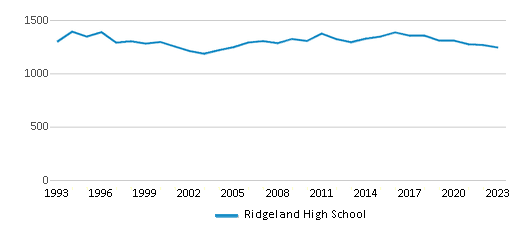
Gender %
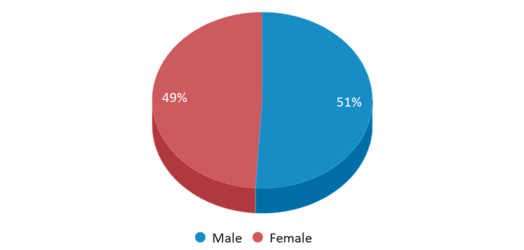
Total Classroom Teachers
90 teachers
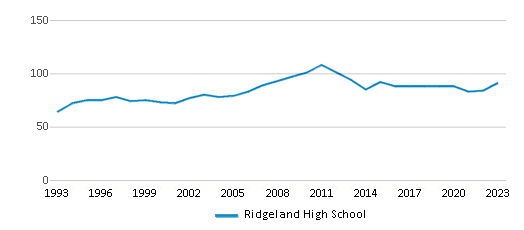
Students by Grade
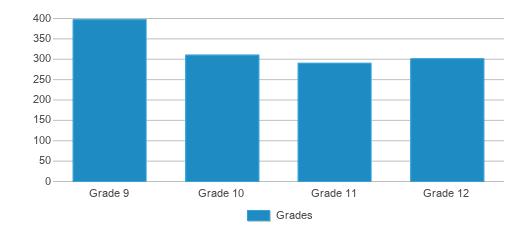
School Rankings
Ridgeland High School ranks within the bottom 50% of all 2,204 schools in Georgia (based off of combined math and reading proficiency testing data).
The diversity score of Ridgeland High School is 0.38, which is less than the diversity score at state average of 0.71. The school's diversity has stayed relatively flat over five school years.
Overall Testing Rank
#1487 out of 2204 schools
(Bottom 50%)
(Bottom 50%)
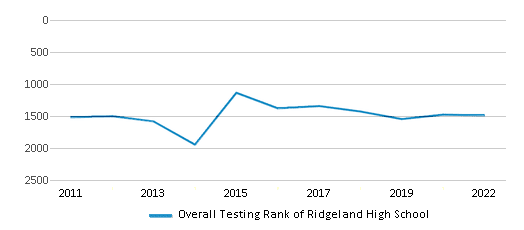
Math Test Scores (% Proficient)
23%
37%
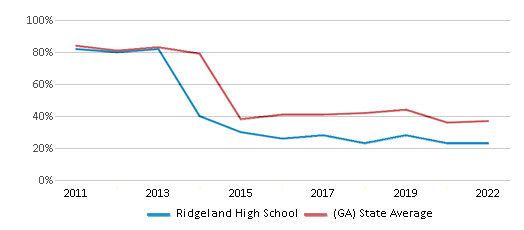
Reading/Language Arts Test Scores (% Proficient)
29%
40%
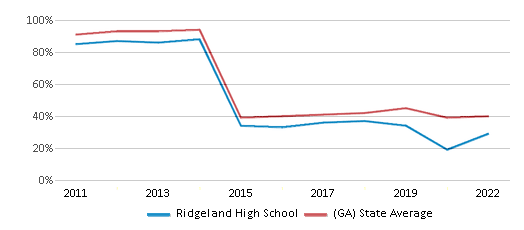
Science Test Scores (% Proficient)
40%
40%
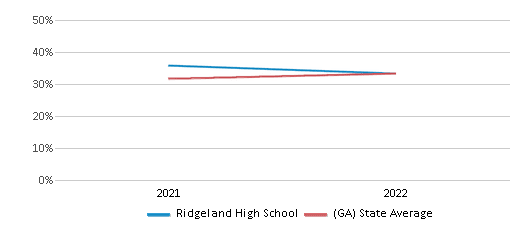
Student : Teacher Ratio
14:1
14:1
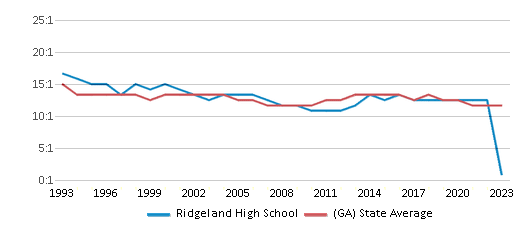
American Indian
n/a
n/a
Asian
n/a
5%
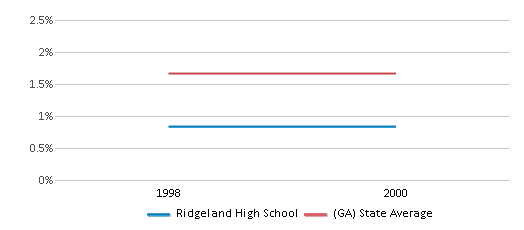
Hispanic
6%
19%
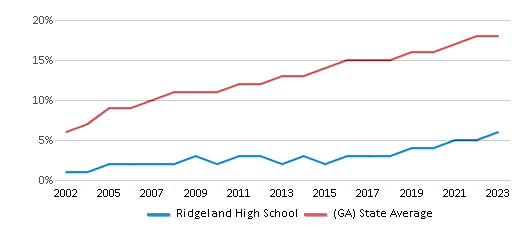
Black
10%
36%
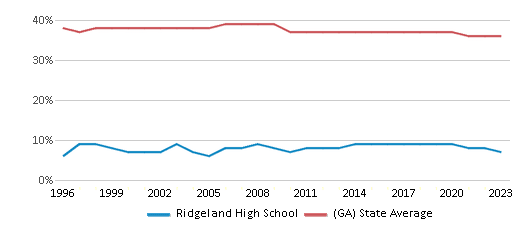
White
78%
35%
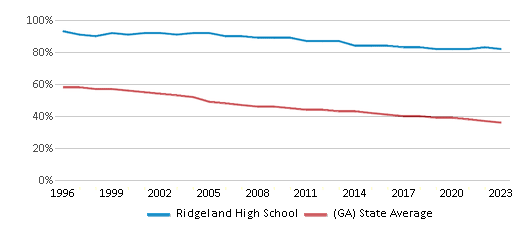
Hawaiian
n/a
n/a
Two or more races
6%
5%
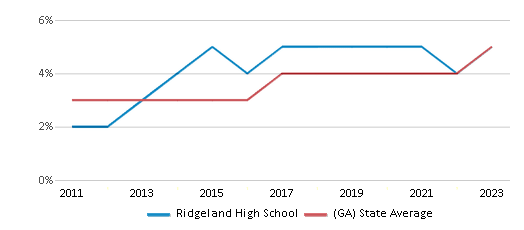
All Ethnic Groups
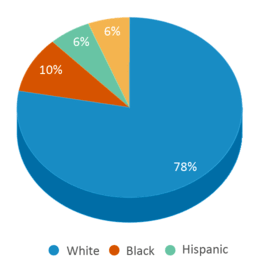
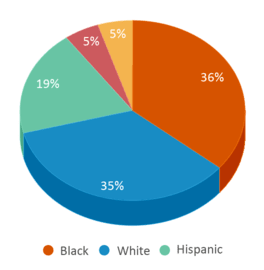
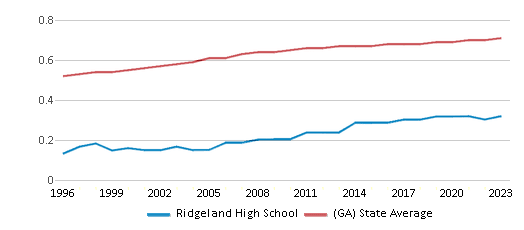
Graduation Rate
92%
84%
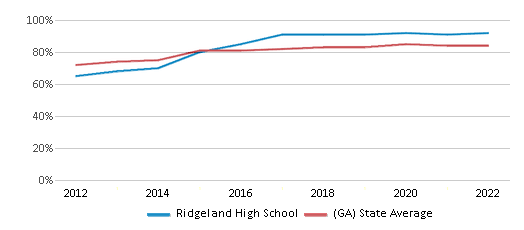
Participates in the National School Lunch Program (NSLP)
Yes
Eligible for Free Lunch
72%
59%
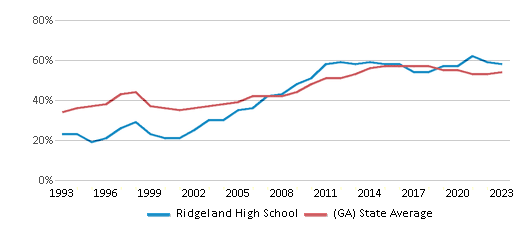
Eligible for Reduced Lunch
12%
5%
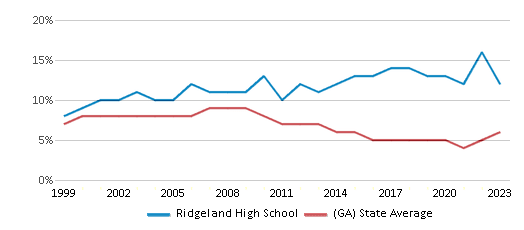
School Statewide Testing
School District Name
Source: National Center for Education Statistics (NCES), GA Dept. of Education
Profile last updated: 02/09/2025
Frequently Asked Questions
What is Ridgeland High School's ranking?
Ridgeland High School is ranked #1487 out of 2,204 schools, which ranks it among the bottom 50% of public schools in Georgia.
What schools are Ridgeland High School often compared to?
Ridgeland High Schoolis often viewed alongside schools like Gordon Lee High School by visitors of our site.
What percent of students have achieved state testing proficiency in math and reading?
23% of students have achieved math proficiency (compared to the 37% GA state average), while 29% of students have achieved reading proficiency (compared to the 40% GA state average).
What is the graduation rate of Ridgeland High School?
The graduation rate of Ridgeland High School is 92%, which is higher than the Georgia state average of 84%.
How many students attend Ridgeland High School?
1,298 students attend Ridgeland High School.
What is the racial composition of the student body?
78% of Ridgeland High School students are White, 10% of students are Black, 6% of students are Hispanic, and 6% of students are Two or more races.
What is the student:teacher ratio of Ridgeland High School?
Ridgeland High School has a student ration of 14:1, which is equal to the Georgia state average of 14:1.
What grades does Ridgeland High School offer ?
Ridgeland High School offers enrollment in grades 9-12
What school district is Ridgeland High School part of?
Ridgeland High School is part of Walker County School District.
School Reviews
5 5/2/2017
This is a great school with great programs. The teachers and staff obviously care about the students and want them to succeed IN SPITE of the superintendent who just wants higher graduation rates.
5 9/19/2011
ITS A GOOD SCHOOL, THEY MESSED UP MY CLASSES AND WOULDNT CHANGE THEM WHEN I ATTEMPTED TO HAVE THEM CHANGED. BUT THE TEACHERS ARE GREAT!
2 1/25/2011
I have grandchildren that attend this school and participate in sports. My grandson has had things stolen from him three times, the level of bullying is ungodly, and the good kids don't want to go to shcool there because of the crap they have to take from the trash that is allowed to attend there. Try harder to catch a thief and do something about the bullies, would you? I have given too much money to programs at that school for my grandchildren to be afraid to go to school or just not want to go because of the way other people are acting. There are drugs in the school and heads turn if you are a sport star. People are talking but never do anything. These are our kids, people, do something please.
Review Ridgeland High School. Reviews should be a few sentences in length. Please include any comments on:
- Quality of academic programs, teachers, and facilities
- Availability of music, art, sports and other extracurricular activities
Recent Articles

What Is A Charter School?
Explore the world of charter schools in this comprehensive guide. Learn about their history, how they operate, and the pros and cons of this educational innovation. Discover key facts about charter schools, including admission policies, demographics, and funding, as well as what to look for when considering a charter school for your child.

10 Reasons Why High School Sports Benefit Students
Discover the 10 compelling reasons why high school sports are beneficial for students. This comprehensive article explores how athletics enhance academic performance, foster personal growth, and develop crucial life skills. From improved fitness and time management to leadership development and community representation, learn why participating in high school sports can be a game-changer for students' overall success and well-being.

February 05, 2025
Understanding the U.S. Department of Education: Structure, Impact, and EvolutionWe explore how the Department of Education shapes American education, from its cabinet-level leadership to its impact on millions of students, written for general audiences seeking clarity on this vital institution.





